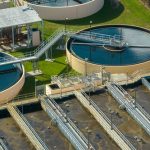Innovative Treatment Technologies for Wastewater

1. Membrane Bioreactors (MBRs):
Membrane bioreactors combine biological treatment processes with filtration using membrane technology. Instead of using traditional sedimentation tanks, MBRs use membranes to separate solid particles and microorganisms from the wastewater. This technology not only provides excellent effluent quality but also reduces the overall footprint of the treatment plant. MBRs are ideal for treating industrial wastewater, as they can handle high concentrations of contaminants and produce a reliable water source for reuse.
2. Advanced Oxidation Processes (AOPs):
Advanced oxidation processes involve the use of powerful oxidants to break down organic and inorganic pollutants in wastewater. These processes generate highly reactive hydroxyl radicals that can effectively degrade persistent and toxic substances. AOPs are particularly useful for the treatment of industrial wastewater containing contaminants such as dyes, pharmaceuticals, and pesticides. They can also be used in combination with conventional treatment techniques to enhance the overall removal efficiency.
3. Constructed Wetlands:
Constructed wetlands are man-made systems designed to mimic the natural processes that occur in wetlands. They utilize plants, soil, and microorganisms to remove pollutants from wastewater. These natural treatment systems are not only highly effective in removing organic matter and nutrients but also provide additional benefits such as habitat creation and aesthetic enhancement. Constructed wetlands are especially suitable for treating municipal and agricultural wastewater while promoting environmental sustainability.
4. Nutrient Recovery Technologies:
Nutrient recovery technologies aim to capture valuable nutrients such as nitrogen and phosphorus from wastewater for reuse. Instead of being discharged into water bodies, these nutrients can be transformed into fertilizer or used for other beneficial purposes. Several innovative technologies, such as struvite crystallization and biological nutrient removal, have been developed to recover and recycle nutrients from wastewater. Nutrient recovery not only reduces the environmental impact of nutrient-rich effluent but also offers economic benefits.
5. Membrane Distillation (MD):
Membrane distillation is a thermal desalination process that uses a hydrophobic membrane to separate freshwater from saline water. This technology relies on the differences in vapor pressure to force water vapor through the membrane, leaving behind salts and other dissolved contaminants. Membrane distillation is energy-efficient and can effectively treat brackish water and industrial wastewater with high salinity levels. It has great potential for water reuse applications in water-scarce regions.
6. Electrochemical Processes:
Electrochemical processes, such as electrocoagulation and electrooxidation, are gaining popularity as innovative treatment technologies for wastewater. These processes involve the use of electric current to remove contaminants through coagulation, oxidation, or reduction. Electrochemical treatment not only offers higher treatment efficiencies but also has the advantage of minimizing the use of chemicals and generating less sludge compared to conventional methods. It is particularly effective in treating industrial wastewater containing heavy metals or complex organic compounds.
7. Green Technologies:
In recent years, there has been a growing emphasis on incorporating green technologies in wastewater treatment processes. Green technologies aim to minimize the environmental impact and energy consumption of wastewater treatment. Examples of green technologies include natural systems such as phytoremediation, algae-based systems, and biofiltration. These technologies offer sustainable and cost-effective alternatives to conventional treatment methods, reducing the carbon footprint and promoting the conservation of natural resources.
Summary
The advancement of treatment technologies for wastewater has revolutionized the way we approach wastewater treatment. Innovations such as membrane bioreactors, advanced oxidation processes, constructed wetlands, and nutrient recovery technologies have improved the efficiency and sustainability of wastewater treatment processes. Membrane distillation, electrochemical processes, and green technologies also offer promising solutions for specific wastewater treatment needs. By embracing these innovative technologies, we can ensure the effective removal of contaminants from wastewater while promoting environmental stewardship and resource conservation.
Need Pumping Equipment in Sunrise Beach, MO?
Categorised in: Water Treatment
